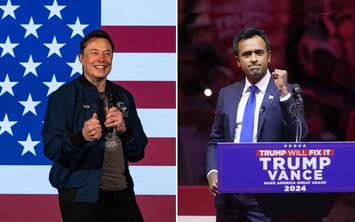
The US is increasingly a country ruled by oligarchs who pour cascading levels of funds into the competing parties. In 2024, election spending was two-to-three times what it was two decades ago in real terms.
To see historic parallels, you have to go back to the Gilded Age in the late 19th century, where great money men and monopolists lorded over the political class, particularly in the Republican Party. This golden age of oligarchy was eventually dimmed by progressive reform and, later, by the New Deal. Today, according to Jacobin, some 40 per cent of all political contributions once again come from the top one per cent of the top one per cent.
Ever since the US Supreme Court’s 2010 Citizens United ruling, which essentially blocked any real attempt to control campaign spending, the situation has worsened. This has generally benefitted Democrats, which is perhaps surprising given the GOP’s traditional ties to the ultra-rich. Wall Street and big-spending oligarchs like Bill and Melinda Gates, Reid Hoffman and Marc Benioff helped Kamala Harris raise well over $1.5 billion, the highest figure in history, for her losing campaign.
Most oligarchs still align with the Democrats, but this year there was a significant drift of investors and tech moguls to the GOP. This has been led by X owner Elon Musk, who gave Trump’s effort an estimated $239 million. Venture capitalists like Marc Andreessen and Wall Street heavyweights like investor Bill Ackman also pitched in, as did many Jewish political-action committees alarmed by the Democrats’ anti-Israel drift.
This shift has been accelerated by the remarkable failures of the incoherent and painfully incompetent Biden administration. Although he was originally marketed as a moderate, or a kind of low-intensity Bill Clinton, Joe Biden instead embraced an ultra-progressive programme that sought to undermine fossil fuels, promote racial quotas, impose censorship on the internet and, most ghastly of all to many rich people, increase taxes, particularly on capital gains.
These policies helped forge a whole new crop of pro-Trump oligarchs, who joined traditional Republican big backers like oil executives and heavy-industry moguls. Examples include Musk, who builds spaceships and cars, as well as a host of cutting-edge ‘defence bros’ like Palantir co-founders Joe Lonsdale and Peter Thiel, and Anduril’s Palmer Luckey.
The Democrats still draw their support from the ephemeral economy concentrated in Hollywood, Wall Street and Silicon Valley. This includes firms like Alphabet (Google), Meta and Microsoft, whose now retired founder, Bill Gates, kicked in a cool $50 million to the Harris campaign. Harris also received hefty funding from the ultra-subsidised green industries.
In the business world, Democrats tend to appeal to established firms like General Motors, who welcome big government. Auto firms seek subsidies and ways to block foreign competitors. In contrast, Trump appeals to upstarts like Musk and Vivek Ramaswamy, the people he has entrusted with downsizing the federal behemoth. Trump’s cabinet and close circle also includes many wealthy people, like South African-born David Sacks, the new crypto tsar, who come from outside the corporate elite.
In essence, the Trump GOP epitomises the revolt of capitalist outlaws. It includes people like proposed treasury secretary Scott Bessent, who comes not from Goldman Sachs (often referred to as ‘Government Sachs’) but instead runs a smallish hedge fund. Another second-tier financial type, former Clinton backer Warren Stephens, has won the coveted ambassadorship to the UK.
Read the rest of this piece at Spiked.
Joel Kotkin is the author of The Coming of Neo-Feudalism: A Warning to the Global Middle Class. He is the Roger Hobbs Presidential Fellow in Urban Futures at Chapman University and and directs the Center for Demographics and Policy there. He is Senior Research Fellow at the Civitas Institute at the University of Texas in Austin. Learn more at joelkotkin.com and follow him on Twitter @joelkotkin.
Photo: FMT, under CC 4.0 License.













Oligarchs?
"Oligarchs" that blew $1.5 billion on the failed Kamala election campaign aren't worth very much as oligarchs. I think Mr. Kotkin overestimates the importance of the billionaire class.
It's impossible to buy elections these days.